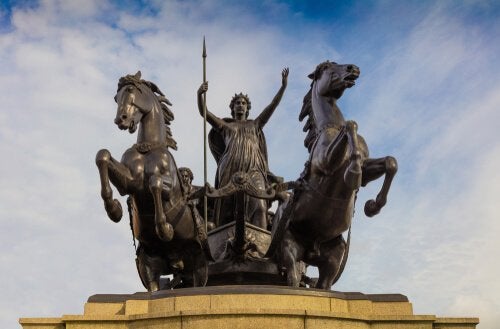61 A. D. , British Isles, at one point what is now Watling Street, the main road built by the Roman Empire to connect Wales with the rest of the island. Boadiceia, a tall woman (by the standards of the time) with long red hair and a sturdy structure, quickly ingests a deadly poison, possibly supplied by her daughters. This is how Tácito narrates the end of one of the great ancient tragedies.
This woman is nothing but the legendary Celtic ice warrior queen, Boadiceia, Boudica in her native language. Remembered for bringing together the British rebellious tribes against the Roman invasion under one command, she obtained the right to enter the list of the greats of Rome. rivals, along with Viriato, Anbal, Arminio, Spartacus or the aforementioned Gallic leader, his legend merges with the stories left to us by his enemies.
- After the famous conquest of Gaul by Julius Caesar.
- The Roman Republic sought new lands and conquests to employ its legionnaires and realize the ambitions of its generals.
- The legendary general planned the invasion of the British Isles.
- Probably interested in dominating the land from which the great Celtic The Druids arrived.
- However.
- The starting sign of the inevitable conquest came from the hand of Emperor Caligula.
Shakespeare left us his play Cymbeline, in these early battles. Subsequently, Emperor Claudius would continue the campaigns. At that time, some tribes joined the protection of Rome, while some warlords, such as Caradawc, carried out more or less victorious revolts. At that time, the conquerors founded Londinium, now London, on the banks of the Támesis.
The jungle guerrillas had continued to win, but without relevance: luck seemed wasted.
One of the kings who allied himself with the Latinos was Prasugatos de Iceni, in exchange for the protection and support of Emperor Nero, this monarch pledged to leave his title and land as a legacy after the death of his daughters. The end of his life came, but he was the trigger for the conflict. Since Roman law did not recognize female heritage, there were no legitimate heirs of the king to them.
Perhaps the most likely end was for the Empire to commit its abuses without difficulty, but the story was that Prasugato’s wife would not bow. At this time we have received the first news from Boadiceia, who as a widow claims her rights according to the tradition of The Queen’s Resistance is received by the generals with plagues, abuse of her daughters and the death of her lieutenants. Meanwhile, so-called Roman allies took the land and attacked local traditions.
The wick of rebellion was lit: Boudica will not fear conflict, giving in is not an option.
Her name, or perhaps the nickname by which she is known, means “the victorious”, and mounted on her chariot of war will guide her people, driven by the humiliations suffered. Bringing several tribes and many other warriors to join it, he will lead the greatest force the Romans will face on the islands. Certainly, his loose hair and war paintings, mounted on his car as in the statue that is now in London in his memory, would generate a terrifying image of his enemies.
With his troops he invaded and looted Londinium and other towns in the south of the island, highly romanticized at the time; Roman historians claim that he did not arouse mercy, certainly like the soldiers of the Mediterranean; defeated without hesitation the mighty Hispanic Legion. , in a difficult step to emulate.
His victories increased the number of his followers, but after almost a year of guerrilla warfare, the Roman general Suetone was able to react.
In a narrow rocky valley, with a great inequality of equipment, discipline and strength compared to the Romans, the great final battle took place. The inability to break the Roman formation ended with the hopes of the Celts, who quickly fled into chaos. an absolute defeat, with a hundred rebel deaths for each of Rome and its allies.
Faced with the inevitable end, Boadiceia again preferred death to captivity, aware of what would happen if they were captured alive. Suetonius could not show the defeated queen, but Britain would never have a leader like her again. revenge has come to an end.
Many warriors fought Boadiceia, and although they never trained most Celtic armies, they also fought for their lives, lands and freedom.

